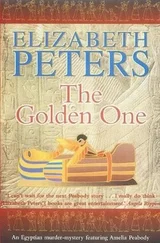Suddenly, unpredictably, his sense of humor came to his rescue. This was a farce, the sort of nasty but harmless joke one schoolboy might play on another. Ramses raised his hand to his brow in ironic salute.
“How neat and tidy you are,” he said approvingly. “What’s the occasion?”
Mansur looked him over, from disheveled head to mud-caked boots, and back again. His deep-set eyes narrowed.
“I apologize for the discomfort you have endured the past few days,” he said.
Ramses smiled and shrugged. He hoped Mansur hadn’t observed him shriek and recoil from his image in the mirror. Rooms of a harem were fitted out with listening devices and hidden spy holes, so that the own er could keep an eye, and ear, on his property.
Mansur gestured him out of the room and preceded him along a narrow corridor. He himself opened a door. “I hope this will make amends,” he said.
It was a bath chamber, lined with mirrors, with a sunken tub large enough to hold a pasha and several of his ladies. The marble was chipped and stained, the mirrors cracked, but the sight was glorious. Steam rose from the water that filled the tub. On a ledge next to the bath, toilet articles and a change of clothing had been neatly laid out. They were his own.
He wanted nothing more than to strip and plunge into the tub but he didn’t want to appear too eager-or appear before Mansur naked. It was a form of humiliation he had been spared so far. He raised an inquiring eyebrow and stood waiting.
“Someone will come for you in a quarter of an hour,” Mansur said. The door closed behind him. Ramses didn’t waste time trying it. Either it would be bolted or there would be a guard. But he took his time about undressing, inspecting the amenities-a bar of highly scented soap, several large but rather threadbare towels, a loofah. He lowered himself into the tub with a groan of pleasure. There were probably peepholes in these walls too, but at that point he didn’t give a damn.
Since he had no way of measuring time, he couldn’t allow himself the indulgence of soaking his stiffened muscles, but he felt a thousand percent better after he had toweled himself off. As it turned out he could have wallowed longer. He was fully dressed and had been pacing the room for what seemed much longer than a quarter of an hour before Mansur returned. He was alone.
“Back to your room,” he said curtly. “Quickly.”
He followed close on Ramses’s heels but instead of opening the door to the harem chamber he put a hard hand on Ramses’s arm and turned him so that they were eyeball to eyeball.
“You are the son of the Father of Curses. The one they call Ramses.”
Wondering what this was all about, Ramses nodded.
With a dramatic gesture Mansur flung the door wide.
“Then who is this?”
One of his men stood over a recumbent form. His face was hidden in the crook of his arm, but Ramses recognized him instantly. His stomach sank down into his boots.
WHAT MAN OR WOMAN will ever forget the moment when he (or she) stood gazing for the first time on the thrice-holy city, its minarets and steeples and its great golden dome swimming in the purple haze of evening?
Emerson, perhaps. His first words were, “What a jumble!”
Conquering my own emotion, I replied, “It is a very ancient city, my dear. Let us pause for a moment here, and reflect upon the centuries, nay, millennia that have passed since David first established-”
“If you can believe the Old Testament, which I don’t, the city was Jebusite before the Israelites took it.”
I looked up at the imposing figure of my spouse. Emerson is always imposing; when on horseback he is no less than magnificent. We had at my direction stopped our little caravan at the top of the last hill. The road was excellent, and although our open carriage was somewhat deficient in springs, that did not detract from the comfort of the journey. Nefret and Selim had also halted their steeds. Her expression was courteously indifferent; but Selim sat gazing in awe at the dome of the Noble Sanctuary, ablaze in the light of the declining sun. Jerusalem was the third most holy city for Moslems; and some might have thought it ironic that the symbol of Islam now dominated the city which had been sacred to Judaism and Christianity before it.
The reverend, seated beside me, had been silent most of the time. Now he stirred and began muttering.
“We entered through the tunnel under the city where the water flowed. We crept in silence, man behind man, obedient to my will.”
“Now what is he babbling about?” Emerson demanded.
“Hmmm. Let me think. Ah-I believe he is responding to your statement about the conquest of the Jebusite city. That means he is now Joab.”
“Who?” Emerson’s brow furrowed. “Oh, yes; the Israelite commander who led troops into the city by way of the old tunnels. Something of a comedown for the reverend, isn’t it-a mere commander?”
“The tunnels are there,” Mr. Plato said.
“Hmph,” said Emerson. “Well, my dear Peabody, have you indulged your romantic fantasies long enough? We still have a way to go.”
He had done his best to destroy my “romantic” mood. He was correct, however; we had yet to enter the city and locate our hotel.
“Yes, let us go on,” I said. “Is Daoud all right?”
Selim looked back at the second carriage, where Daoud was sitting surrounded by boxes and bales and baggage. He had insisted on occupying that position, “to keep the heathen from stealing our things.” I had explained to him that most of the local inhabitants were not heathens, but coreligionists of his. The argument made no impression on our friend; by his definition heathens were foreigners and foreigners were heathens.
“He waves to say all is well,” Selim reported. “He is hungry, I think.”
It was a safe assumption. Daoud was a very large man and required frequent meals.
Traffic was brisk, as people sought the city before the fall of night. Camel trains, shepherds and their flocks, the innumerable and omnipresent little donkeys kicked up clouds of dust. I did not doubt the pilgrims found them very picturesque. There were several other carriages like ours on the road, and other riders, including a few females uncomfortably encased in woolen habits riding sidesaddle. They looked absolutely miserable.
The road led us down a slope and back up toward the heights on which the ancient city had been built. From my reading I knew it was not a plateau but separate hills which had once been divided by a deep valley, now partially filled in by the accumulated debris of centuries. Other valleys bounded the city on two sides, the Kidron on the east and the Hinnon on the west. The descent on both sides was steep, and Emerson’s rude description had some justice to it; an untidy jumble of structures clung to the slopes as if they had slid over the edge and stuck partway down.
The Old City itself was girded by the magnificent wall built by Suleiman the Great in the twelfth century. We entered through the Jaffa Gate, one of seven, and found ourselves in a commercial district of comparatively recent date, with shops and banks and hotels. After we had passed several of the latter I began to suspect that the hostelry selected by Emerson and the confounded War Office would be neither new nor convenient.
Before long the modern streets were succeeded by the narrow winding lanes of a typical mideastern city. Fortunately our drivers knew the way; guidebook in hand, I attempted to follow our route but lost track within a few minutes. My attempts to locate sights of interest-the Ecce Homo Arch, the Church of the Holy Sepulchre, and so on-were frustrated by increasing darkness and the inadequacy of the map in the book. The Dome of the Rock was hidden by the houses and small shops that closed in the street, so even that landmark was no longer visible. I gave it up, and addressed Mr. Plato, who was peering interestedly out the window of the carriage.
Читать дальше








